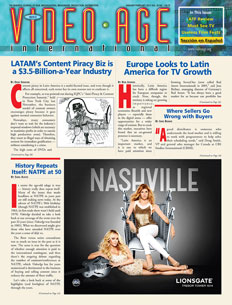January 2012
Volume 32 No. 1
My Two Cents
Film Festivals are useless to the industry
Let me explain why, in my view, film and TV festivals — but film festivals in particular — have become useless to our industry.
I’ve counted 360 major film festivals around the world; one held almost every day of the year. The proliferation of such festivals was one of the conference topics at the 2012 American Film Market (AFM). The AFM’s organizers stated that there are some 4,000 audiovisual festivals worldwide.
These festivals are held for a sector that employs only about one million people worldwide, which is not surprising, considering that the core of the international film business’s commercial area comprises no more than 10,000 people.
The goal of most, if not all, of these festivals is to place American films in competition and to encourage Americans to participate. But, if American executives and talent (actors, directors, scriptwriters) were to participate in even a small fraction of the festivals around the world, they would not have any time left for work.
In the past, film festivals were beneficial to the industry because they helped save publicity costs. They were also helpful for finding distribution channels or securing financing or co-producers for future projects. Today, with the evolution of the film and TV industries and their new economic and exploitation models, the advantages festivals once provided are gone, rendering these events basically useless to the professional sector.
Specifically, for movies in the $100 million range, entering a competition is a risky undertaking since the film could embarrassingly lose, but also because the producer would have to relinquish control of its marketing. Plus, imagine if a movie with a genre not clearly defined were described as a “comedy” when the producer saw it as a “drama.” This is without considering out-of-pocket costs that the festival does not cover.
In addition, nowadays film festivals are no longer useful to companies as a means for finding new content to distribute. Indeed, A-list titles have distribution in place even before the movies are produced, and B-list titles, mainly from indies, are known because they require financing, pre-sales and co-producers. The rest of the films are not invited or selected by festival organizers. Therefore, in order to find them, distributors have to attend trade shows such as AFM or festivals that have markets attached, such as the Cannes Film Festival or TIFF. This is why AFI, the film festival held in the heart of Hollywood, changed its date and attached itself to the AFM in November in order to survive.
In its AFM edition, VideoAge documented why film festivals are no longer useful to companies as a source of new content to distribute.
The only people left to benefit from festivals are producers with unusual movies that actively seek to enter as many festivals as possible to get some visibility and to find willing distributors (outside of those who’ve already passed on them).
Unfortunately, festival organizers want to get local media attention; therefore, they do not pay attention to C-list movies that would have otherwise attracted more industry attention. In addition, some festivals have become a legal form of political patronage, thus they require lots of media attention in order to justify the use of public money.
To survive the industry’s new paradigm, festivals should first and foremost serve the industry: Only in this way will they attract attention from the sector and thus make participation necessary. This is why it is important for a festival to focus on films that don’t have distribution in place, or those that have only partial distribution. Plus, festivals should organize concurrent trade shows for those films that have not been selected for competition and are without distribution.
The “glamour” aspect of a festival should be found elsewhere, such as at conferences, where stars can participate without risking negative backlash — like Robert Redford and Arnold Schwarzenegger, who hosted conferences at MIPCOM to promote their projects. Another option is to create awards like the Los Angeles Press Club, which established an “Oscar for Entertainment Journalism,” bestowed upon Jane Fonda.
Dom Serafini

